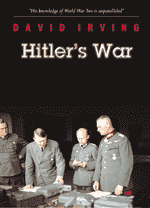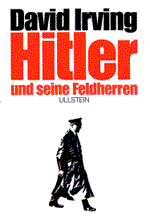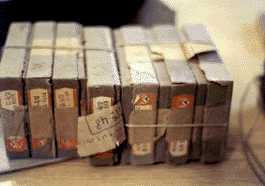|
Peter Myers of Australia asks Saturday, September 8, 2007 why there are subtle changes beetween the various editions of Hitler's War
Why the omissions from later editions of Hitler's War? I OPERATE an email list, and dealt with Hitler's War in one bulletin. A reader challenged my claim that Hitler's policy was to "ethnically cleanse" the Ukraine of its native population, even though they were as "Aryan" as the Germans. Israel has a similar policy in relation to the Arabs surrounding it, even though they are as "Semitic" as the Jews, or more so.
There is a downloadable internet edition, of which I have the edition dated April 13, 2001. I thought I would save myself having to scan the text in, by copying from the internet edition. But I found that you had edited out much of this material from the internet edition, even though that new edition is bigger overall. I therefore scanned in material from the Papermac 1977 edition (Macmillan, London). Originally, my interest was only in German treatment of Ukranians. I wanted to avoid Jews, because that issue is so politicised. I thought that German policy on Ukranians would show even to Hitler-supporters the narrow-mindedness and sadism of Nazi racial policy. In addition, their mistreatment of the Ukranians (and Russians) deprived them of allies against Stalin. Or rather, made people who originally treated the Germans as liberators, retract that support. For example, this quote from you 1977 edition: "In the eyes of many Germans a great opportunity had been lost - that of winning at least the traditionally anti-Soviet Ukrainians to their cause. ... "I know that we always used to say the Slav liked a good whipping," said Rosenberg, who went on to complain that some Germans in the Ukraine were taking this literally and strutting around with whip in hand; this was a bitter blow to the Ukrainians' self-esteem. Hitler approved an order Rosenberg had drafted curbing Koch's excesses, but in private he believed Koch's doctrine was the proper one. Goring also supported the tough line, telling his generals in April after a conference with Hitler: "The Russians are an enemy with barbaric methods. We are not going to introduce such methods ourselves, but it will be necessary for us to express ourselves more harshly." (p. 385) In view of your having removed, from later editions, material which shows the Nazis in a bad light, I decided to scan in additional material from the 1977 edition as well, and cover the issues of Jews and euthenasia. The 1977 edition elicited high praise from reviewers; you quote some of their comments in your 2001 edition, but I wonder if praise for the 1977 edition can be assumed to apply to the later edition. WHY did you edit that material out? Perhaps the entrenchment of minority lobbies in the West from the 1990s (the Jewish and its proxies or honoraries -- the feminist, the gay lobby etc), the spreading laws against "hate speech", the open-door immigration policies, the dumbing down of school standards -- perhaps these things persuaded you that Hitler was right, and that his sins needed to be screened from view. Given what you wrote in the 1977 edition, one wonders why you were jailed recently. Readers in North America cannot assume that Australians share their perspective. For Australians, Hitler's alliance with Japan, and his endorsement of its launching the Pacific War, make support for him untenable. A man who many see as "the defender of the white race" ended up helping evict the European empires from India and the Western Pacific. Hitler himself felt ambiguous about this aspect of the war, and I included your material on it. My distaste for Hitler does not mean that I have joined the ranks of "Hitler-bashers", like the Trots, the Larouchites etc. Rather, I would normalise Hitler. If one can be impartial in appraising Napoleon, why not Hitler? Why not admit that he was right about some things, even if wrong about others? He was a mix of genius and foolishness. Genius for his rebuilding the German economy, foolishness for his racism and militarism. His legacy continued after the war: the Japan economic Model was an adaption and descendant of Nazi economic policy, as Richard A. Werner, Professor of International Banking at the University of Southampton, shows in his book Princes of the Yen. It also shaped the economies of Taiwan and South Korea, as a result of the Japanese occupation of those regions. And China used it to develop the China Model. Peter
Myers
 David Irving replies:
Over the next fifteen years I surfaced further unknown materials, including the diaries of Morell, Göring, Rommel, and others; a new edition of the Hitler biography was prepared and issued in 1991 by us, Focal Point Publications. To make space for the new materials, I pruned the verbose, shortened other passages, and omitted repetitious material; part of this routine editing work was capably done by a colleague, Dr Rosemarie Schäfer, now von dem Knesebeck, following broad guidelines which I gave her.
Needless to say the neutral Professor Richard "Skunky" Evans pounced on some of the omissions in the highly-paid expert report which Penguin Books and Deborah Lipstadt commissioned from him in their defense of my libel action against them, suggesting some kind of ulterior pattern in the cuts. There was none. I did not tell Dr. Schäfer, "Try to omit stuff which reflects badly on Adolf." Some of the omissions, I now regret -- a passage from a May 1944 speech by Heinrich Himmler, for example, which I should on reflection have left in. The book as reissued is however already a thousand pages long.
Now for the good news: As the current edition of Hitler's War (Millennium Edition, 2002) is now nearly sold out, we shall shortly begun a new revision process, this time in the other direction, with the intention of expanding the book to its original prose-length, including the additional material, in a two-volume edition totaling perhaps 1,500 pages. I shall again hire a history postgraduate to do some of the bricks-and-mortar work involved; and I shall hope that I do not reap ignorant blame for any changes that we make. | ||||||||||

 My
source was the 1977 print edition of Hitler's
War 1939-1942 (left)..
My
source was the 1977 print edition of Hitler's
War 1939-1942 (left).. ALLOW
me here to address only the question why the
different editions of Hitler's War vary in
content. The first edition appeared in Germany
(left) in 1975, and in London and New York
in 1977.
ALLOW
me here to address only the question why the
different editions of Hitler's War vary in
content. The first edition appeared in Germany
(left) in 1975, and in London and New York
in 1977.  The
first beneficiary was the German publisher
Langen-Müller who issued the updated edition
as Führer und Reichskanzler in 1989
(right).
The
first beneficiary was the German publisher
Langen-Müller who issued the updated edition
as Führer und Reichskanzler in 1989
(right). In
2001 we issued a yet again revised edition,
incorporating now for example rare materials from
the Goebbels Diaries (left) which I had exclusively
brought back from the KGB archives in Moscow in
June 1992, and the recently released
In
2001 we issued a yet again revised edition,
incorporating now for example rare materials from
the Goebbels Diaries (left) which I had exclusively
brought back from the KGB archives in Moscow in
June 1992, and the recently released